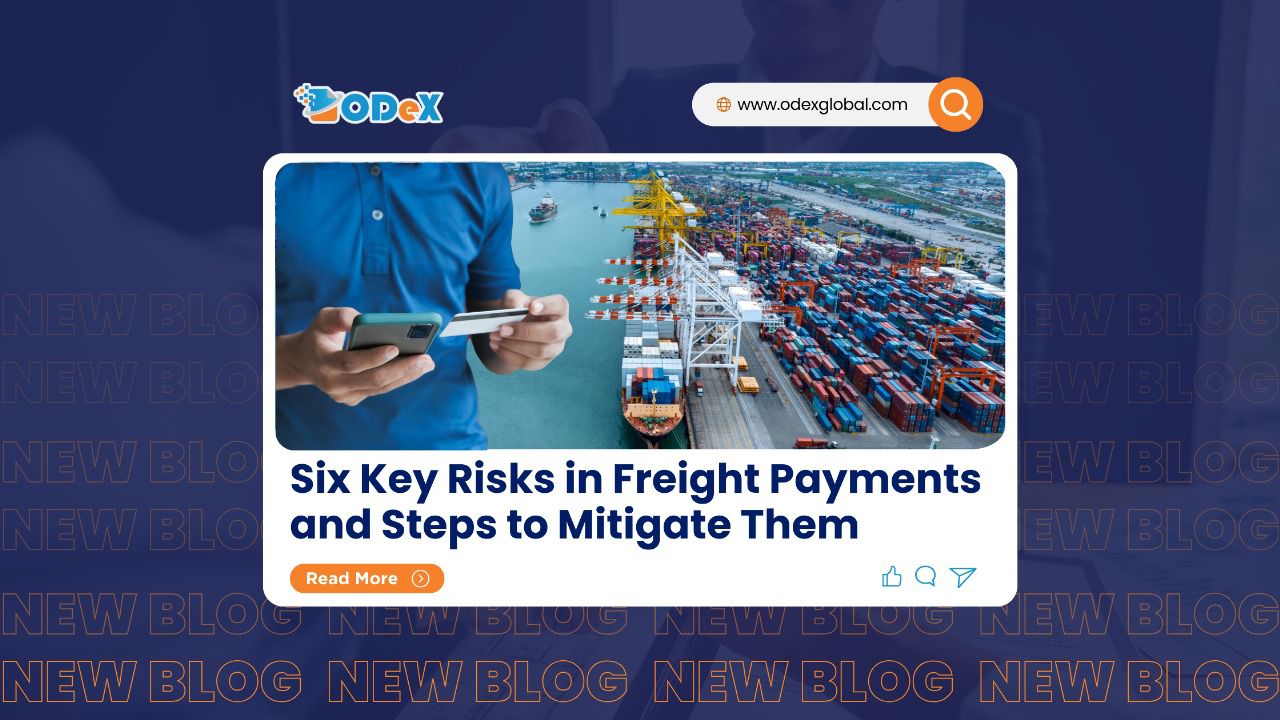Six key risks in freight payments and steps to mitigate them
Risk is an inherent aspect of our everyday life. This is particularly true in the shipping and freight industry, where the significance of risk is magnified, especially concerning freight payments. Freight payments are critical to ensure the movement of goods across borders. Due to high transaction volumes and multi-party payment chains, the sector is particularly vulnerable to risks such as delays, fraud, currency fluctuations, and compliance breaches.
A single payment mishap can lead to severe shipment delays, financial losses, and strained business relationships. In this article, we explore six key risks in freight payments and how you can mitigate them through innovative strategies and secure payment solutions.
1. Payment delays
The risk: Late payments to vendors, suppliers, authorities, and carriers can severely disrupt supply chains as cargo release may be withheld, leading to unwanted and avoidable costs. In addition, if these delays are ongoing and regular, suppliers may refuse future shipments. This means you must find alternate suppliers, which is a heavy administrative and financial burden.
The solution:
-
Establish clear payment terms with specific deadlines with your supplier as part of the sales contract.
-
Use technology that provides options for automated payment reminders and payment scheduling systems to ensure timely disbursements.
-
Implement milestone-based payments where carriers are paid in stages as key shipping events are completed.
2. Freight payment fraud
The risk: Fraudulent bills of lading, phishing attacks, and invoice manipulation are common in global supply chains.
Norton Rose Fulbright, a global law firm, states “Banks and cyber authorities have long been warning businesses to be vigilant when paying supplier invoices, but the threat of supplier invoice fraud has only been increasing. This type of fraud now accounts for approximately 55% of all fraud in the UK, with UK businesses losing an average of £295,000 a year to the scams.”
Supplier invoice fraud occurs when fraudsters impersonate suppliers or hack genuine supplier email accounts to send fake invoices or change payment details, causing purchasers to unknowingly transfer funds to the fraudster instead of the legitimate supplier.
Fraudsters may also intercept sensitive payment information or create fake shipping websites to steal funds.
The solution:
-
Use secure payment platforms with multi-layered security, such as encryption, two-factor authentication, and fraud detection tools.
-
Verify vendors/suppliers before initiating payments and avoid making payments based on email requests without proper verification.
3. Compliance issues
The risk: Non-compliance with trade regulations can result in heavy fines, shipment holds, and even legal action. International shipping involves complex regulatory frameworks that change frequently. The risk includes blacklisting, possible shutdown by the authorities and risk of reputational damage.
The solution:
-
Stay updated on global trade regulations, including customs duties, tariffs, and payment documentation requirements.
-
Use compliance monitoring tools and systems that flag potential regulatory violations before processing payments.
4. Managing currency fluctuations
The risk: Currency fluctuations can disrupt international freight payments, impacting profit margins and pricing for exporters and importers. For example, in 2024, the Japanese yen fell to ¥160 per U.S. dollar, prompting government action. Meanwhile, geopolitical events like the Russia-Ukraine conflict caused freight rates to rise by up to 20%, highlighting the need for robust risk management in global trade.
The solution
-
Use currency hedging strategies such as fixed-exchange contracts and forward contracts. Consider payment terms in stable currencies like USD or EUR to reduce currency risk.
-
Include currency adjustment clauses in contracts to share exchange rate risks with partners.
-
Source from multiple regions diversifies suppliers and minimizes reliance on a single currency. Negotiating longer payment terms or requesting payments in stable currencies provides additional security. Securing long-term freight rates with forwarders also reduces unpredictability.
-
Use digital freight payment platforms streamlines payment processes while mitigating currency risks through integrated financial tools.
5. Invoice disputes
The risk: Invoice disputes due to incorrect or incomplete invoicing can cause payment delays, disrupt cash flow, and strain your business relationships.
Studies indicate that 61% of late payments result from such disputes, affecting 64% of small and medium-sized businesses. These delays disrupt cash flow and erode trust between companies and their clients.
The solution:
-
Adopt automated invoicing systems that generate accurate invoices with clear payment terms, itemized charges, and tax calculations.
-
Implement digital freight payment platforms to streamline invoice processing by automating invoice matching, validation, and payment, reducing human errors while data interchange ensures accurate, real-time data sharing between shippers and carriers. Collaborative platforms also enable transparent communication, fostering quick dispute resolution.
6. Lack of payment visibility
The risk: Without real-time visibility, you may lose track of pending payments, increasing the likelihood of missed deadlines and payment disputes.
The solution: Use digital payment platforms with real-time payment tracking, automated reconciliation, and reporting features. This ensures complete visibility into all financial transactions and reduces payment-related uncertainties.
Safe and transparent payment processes with ODeX
ODeX Global offers a robust digital payment platform tailored to the logistics industry, which includes key features such as:
-
Automated Payment Processing: Streamlined payment workflows with automated validation.
-
Secure Transactions: End-to-end encryption and fraud detection protocols.
-
Compliance Checks: Automated compliance checks for trade regulations and customs duties.
-
Real-Time Visibility: Transparent payment tracking and instant alerts.
Additionally, ODeX has integrated with PayPal to facilitate secure and efficient payments, allowing users to make transactions directly through the platform.
Conclusion
If left unchecked, freight payment risks can disrupt even the most efficient supply chains. Businesses must adopt proactive risk management strategies, including secure payment platforms, automated invoicing, and regulatory compliance tools.
ODeX Global’s payment solutions offer the reliability and transparency that logistics companies need to minimize risks and ensure smooth, secure trade operations.


















